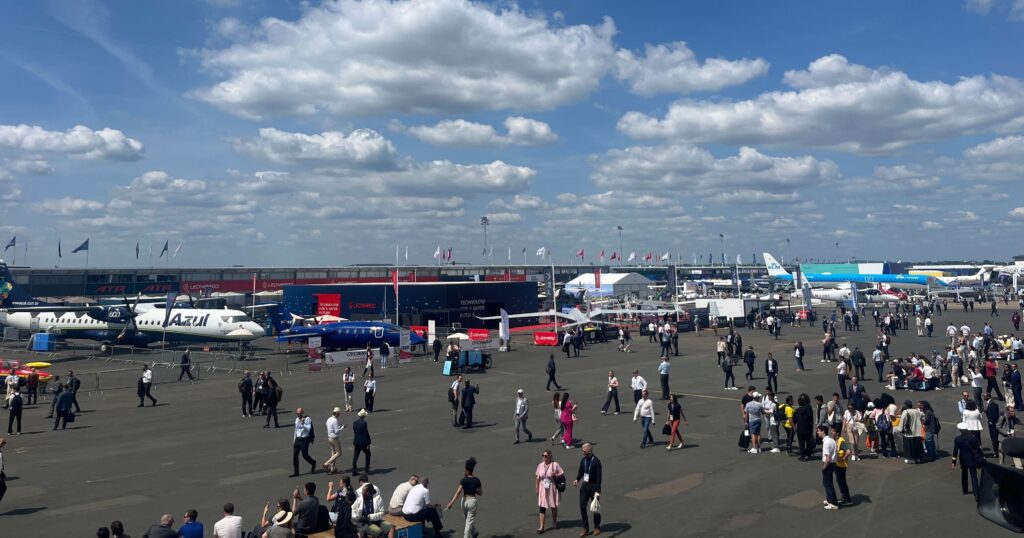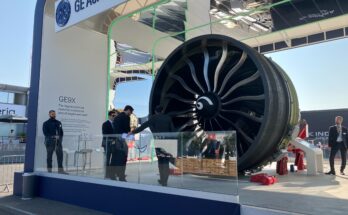Highlights, Headlines, and Happenings from the Paris Air Show 2025.
MONDAY
The Paris Air Show, a marquee event where aerospace giants gather to celebrate innovation and announce major deals, opened under a cloud following the crash of a Boeing 787 in India—the deadliest aviation accident in a decade. Just as Boeing, under new leadership, was poised to project renewed optimism, the tragedy forced the company and key partner GE to cancel show appearances and events.

Amid growing European defense spending and doubts about U.S. commitment to NATO, the 2025 Paris Air Show is also placing a heightened emphasis on defense in response to the prevailing uncertainty. While American defense firms see a chance to win contracts, European leaders are prioritizing investment in their own defense industries, potentially curbing U.S. sales. However, with the urgency of the war in Ukraine and ongoing threats from Russia, European nations may still rely on American technology in the short term.
Today’s news included:
Boeing predicts a need for 43,600 new commercial airplanes over the next 20 years, driven by significant growth in emerging markets, which will account for over 50% of the global commercial fleet by 2044. This forecast, released ahead of the Paris Air Show, anticipates global passenger traffic doubling and highlights that single-aisle aircraft will comprise 72% of the fleet.
Pratt & Whitney is launching Hot Section Plus (HS+), an upgrade for the PW1100G-JM engine (powering the Airbus A320neo) that provides 90-95% of the durability benefits of the GTF Advantage engine, primarily through enhancements to the high-pressure turbine and combustor. This option, requiring about 35 new parts, will be available for installation during maintenance visits starting in 2026 and will be fully interchangeable within mixed fleets.
AviLease has agreed to place an order for 20 Trent XWB-97 engines that will power 10 Airbus A350F aircraft. This will be the first Rolls-Royce powered freighter aircraft to operate in the Kingdom of Saudi Arabia.
Frontier Airlines has selected Pratt & Whitney GTF engines to power 91 new Airbus A321neo aircraft, with deliveries starting in late 2026, bringing their total commitment to 235 GTF-powered A320neo family aircraft.
Pratt & Whitney and Cebu Pacific have finalized a 12-year EngineWise™ comprehensive maintenance agreement for Cebu Pacific’s GTF engine fleet, including engines for up to 152 A321neo and 15 A320neo family aircraft.
The Bombardier Global 7500 set a new speed record from Montréal to Paris, completing the flight in 5 hours and 30 minutes, reaching over 1,000 kph. This is one of over 100 records for the flagship jet, as Bombardier prepares to launch the even faster Global 8000.
Textron Aviation debuted its new multi-mission Beechcraft King Air demonstrator at the 2025 Paris Air Show, showcasing the aircraft’s versatility for special operations with features like extended range tanks, advanced sensor capabilities, and a cargo door.
Venturi Space has unveiled MONA LUNA, a 100% European-built lunar rover designed to advance Europe’s technological independence in lunar mobility. This vehicle, developed by Venturi Space France in Toulouse, is backed by the ESA and CNES to meet their strategic needs. The ultimate goal is to deploy MONA LUNA at the Moon’s South Pole by 2030, providing Europe with a crucial lunar-capable asset.
China’s COMAC has returned to the Paris Air Show by signing two key agreements for its C929 widebody program with Safran and Crane Aerospace and Electronics. The memorandums of understanding cover essential systems for the in-development jet, including landing, oxygen, and ice detection systems from Safran, and cabin door sensors from Crane. This progress follows COMAC’s 2024 announcement that Air China will be the launch customer for the C929.
ATR and Pratt & Whitney Canada announced their intent to collaborate on advanced propulsion technology for regional turboprop aircraft, focusing on low-emission solutions and enhancing the PW127XT engine. Their partnership will explore improvements in thermal efficiency, advanced materials for durability, optimized engine integration, and the disruptive potential of hybrid-electric propulsion for ATR’s next-generation ‘EVO’ concept.
LOT Polish Airlines ordered 40 Airbus A220 jets. The new deal, the first order for Airbus jets from the carrier, includes 20 A220-100s and 20 A220-300s. Airbus says the airline could eventually order up to 84 A220s. The new A220s will gradually replace the LOT’s existing regional fleet.
Riyadh Air, Saudi Arabia’s new premium international airline, placed a firm order for 25 A350-1000 aircraft, with an option to double the order to 50. This agreement makes Riyadh Air the first Saudi airline to operate the A350-1000 and supports the nation’s Vision 2030 goal of becoming a global aviation and tourism hub.
ANA Holdings finalized a firm order with Airbus for 24 A321neo and 3 A321XLR aircraft. This order will modernize the group’s fleet, with 14 A321neo aircraft allocated to All Nippon Airways (ANA) and 10 A321neo plus three A321XLR aircraft destined for its group airline, Peach Aviation. Peach Aviation will notably become the first Japanese airline to operate the A321XLR, the longest-range single-aisle aircraft available.
A loss of engine power is emerging as a potential cause of the Air India Boeing 787-8 crash in Ahmedabad, which killed at least 279 people. The aircraft, powered by General Electric GEnx engines, reportedly failed to climb above 450 feet after takeoff due to lower than normal thrust. This new information has shifted focus from earlier speculation about the aircraft’s wing flap and landing gear configuration. Indian authorities are now conducting urgent inspections of fuel systems and electronic engine controls on other Boeing 787s in the country.





